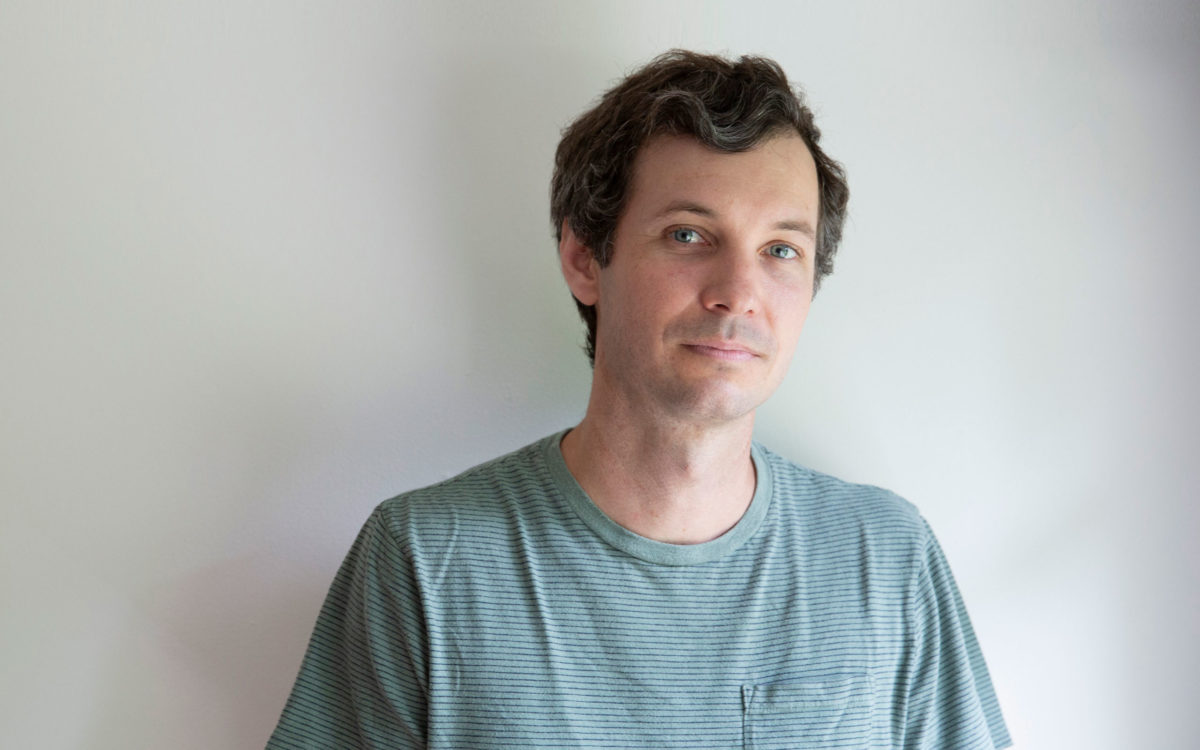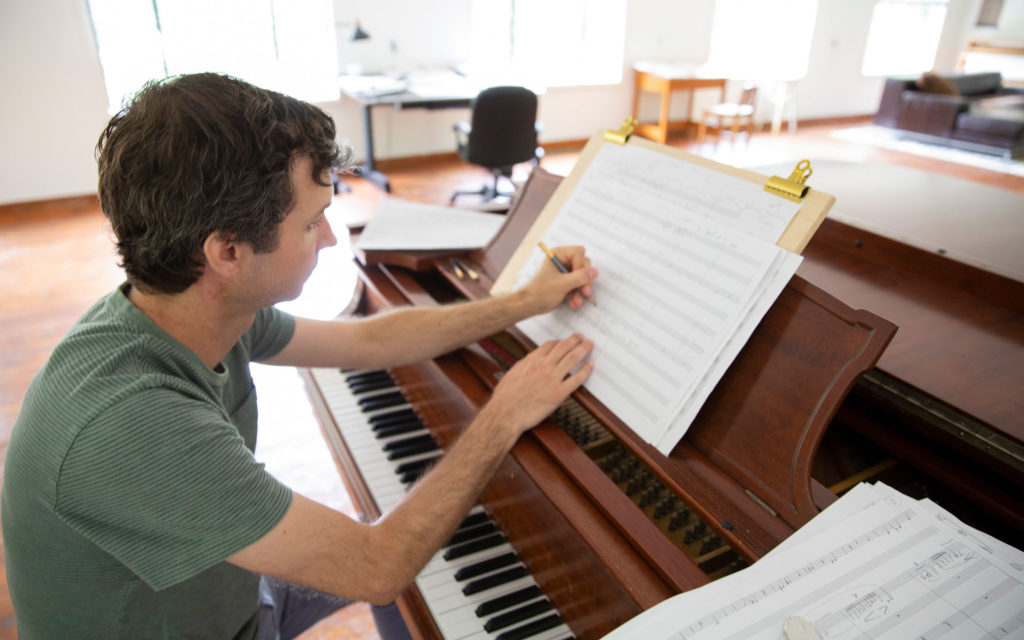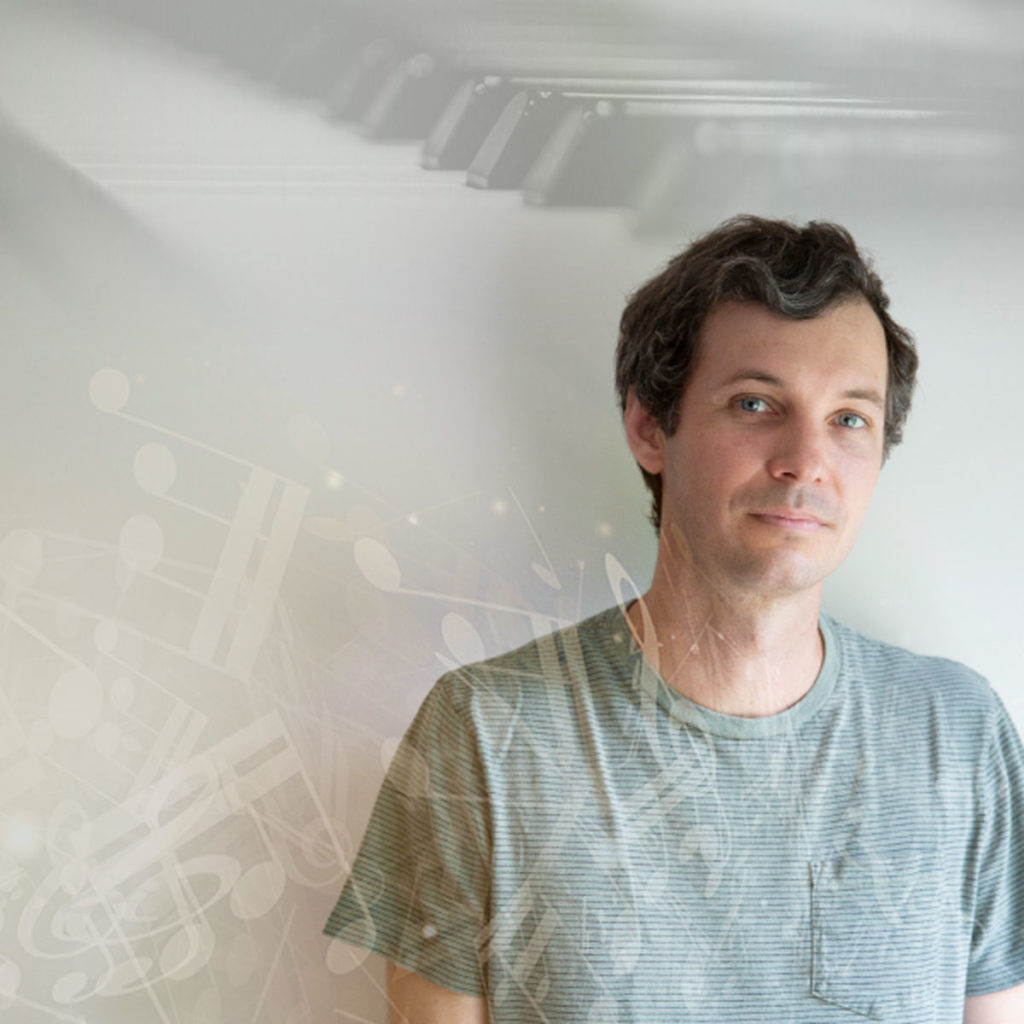The Art and Science of Composition
Dr. Benjamin Krause
As a youngster growing up in California, Dr. Benjamin Krause realized that no matter how excited he got playing other people’s music on the piano, at some point he would have to compose himself.
“In the beginning, it was all about just playing the piano,” recalled Krause (rhymes with drowsy), assistant professor of music and award-winning composer. “I played guitar and a little percussion, but I was always wanting to make stuff up on the piano, writing little songs and loops that sounded like movie themes or pop songs. I was doing that from the age of eight.
“Then in college it all kind of came together. I was studying piano but realized I really didn’t have a passion for piano by itself. I wasn’t going to become a concert pianist, so I started taking composition more seriously and learning about the history, the theory, different styles of music. I realized that was what I was meant to do. In particular, encountering jazz music and learning jazz piano opened up a whole world of sounds and possibilities for me, and deepened my interest in improvisation and composition.”
While Krause teaches courses in the Hope College music department’s core curriculum, including piano, jazz, music theory and aural skills, his passion is to mentor and inspire students who have the same revelation he received in college.
Certainly he has credentials to inspire any fledgling composer. A devotee of vocal and instrumental formats ranging from classical to jazz, new music and beyond, Krause has performed at New York’s Carnegie Hall and received a prestigious Copland House Residency Award in 2018, the same year he joined the Hope faculty on a part-time basis, commuting three days a week from his Chicago home. In 2018 he also was named Distinguished Composer of the Year by the Music Teachers National Association.
Yet Krause says his latest honor is his most prominent, and perhaps most challenging: in 2020 he won a national competition and was commissioned to compose an original work for the Atlanta Symphony Orchestra.
“It’s called the Rapido! Competition,” he said. “I’d heard about it for years, but due to the pandemic I was home with extra time on my hands. They give everybody two weeks to submit their finished work.”
Two weeks? Isn’t that kind of… quick?
“No, that’s extremely quick,” Krause said, laughing. “Which is why they call it Rapido! — as in, work quickly. There aren’t many competitions like that, which makes it kind of a novelty. But I think it’s also grounded in the idea that historically, composers and other artists have had to work very quickly, on deadline. When I’m working on my music, I feel like it’s never 100 percent the way I want it, but there comes a time when you have to let it go. Like a teacher of mine used to say, ‘Bless and Release.’”
“I think of composition, especially recently, as a process of discovery. I’m not necessarily ‘coming up’ with something; I’m finding it… but I would say it usually starts with something I find musically compelling. I look for something that kind of gets my heart pumping or that I find beautiful. Once I find it, it’s like sifting through sand and finding little bits of gold. Then I get excited and start building on that.”
Winning the Rapido! Competition for a chamber work for four instruments (which Krause later expanded into a larger piece, “Notes from Inside”) led to his orchestral commission for the Atlanta Symphony Orchestra. So how is that piece coming along? “Oh, I haven’t even started it yet,” he said this summer, laughing again. “It’s a long process, and it’s probably going to be done sometime in 2023–24. I’m waiting to see if they’re going to give me an assignment. That’s just how orchestras do things, and the piece itself is going to take a while. I probably won’t even begin until sometime early next year.”
When in composition mode, it’s not unusual to find Krause engulfed in sheet music paper, translating his inspirations into the musical score. “I think of composition, especially recently, as a process of discovery,” he reflected. “I’m not necessarily ‘coming up’ with something; I’m finding it.” He draws a lot of ideas from literature, such as the poetry of Amy Lowell, whose Pulitzer Prize-winning work inspired the music that earned Krause an honorable mention in the 2020 National Association of Teachers of Singing Art Song Competition.
“But I would say it usually starts with something I find musically compelling. I look for something that kind of gets my heart pumping or that I find beautiful. Once I find it, it’s like sifting through sand and finding little bits of gold. Then I get excited and start building on that.”
When working with budding young composers, “I feel so much of my advice comes from the best advice I’ve received,” he said. “My philosophy is to find my students’ own goals and aspirations and put those front and center. I don’t mean What do they want to do in 10 years? — but What is the music they’re hearing or feeling? What are they moved by?” He builds from that, challenging students in a variety of ways “so the tool kit they come out with is more complete, more robust. They learn different tricks and tools for solving creative problems.”
In late 2021, Krause collaborated with Dr. Pablo Peschiera ’93 of Hope’s Department of English to create a vocal piece for the Chapel Choir to sing at Hope’s annual Christmas Vespers services. And July brought Krause a particularly memorable moment: the premiere of a major piece he composed for choir and instrumental ensemble at his alma mater, Valparaiso University, to mark the 40th anniversary of Lutheran Summer Music, a festival and residential academy for high school and junior high students. Krause has been composer in residence there for five years. “It’s my first piece I’ve been able to finish since becoming a father,” he said, “so that means a lot to me, to kind of get back in the swing of things.”
In February Krause’s wife, Christina, gave birth to the couple’s first child, a son named Adrian. “It’s been a really huge change, obviously,” he said, “but it was great to have this summer mostly just quiet and enjoy a lot of good family-at-home time.
“Honestly, it was fun for a while, having that kind of back-and-forth lifestyle from Chicago to here, because we still got to enjoy all the big city stuff. But now it’s really nice to be here and have a more stable lifestyle with our son. It’s quieter than Chicago, but Holland has a lot to offer, too.”






